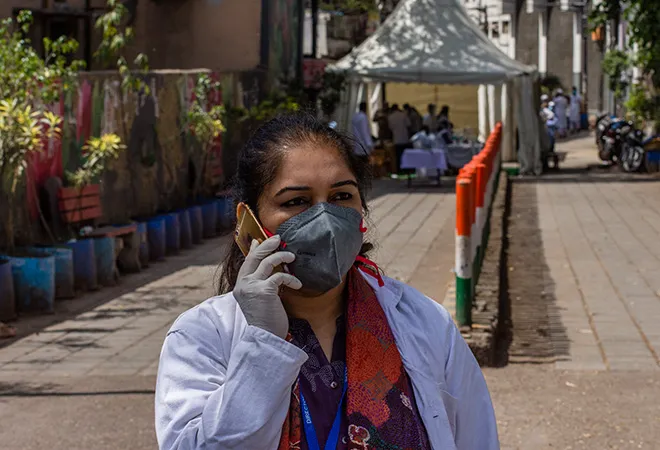
The world is currently experiencing a massive public health crisis due to the Covid-19 virus. The virus had already created widespread death and destruction before the WHO declared it a pandemic on 11 March, and the situation has only worsened since then. Most parts of the world are under a lockdown, mobility has reduced to its lowest ever level, trade has been disrupted, unemployment rates have risen, and thousands of people have died worldwide.
Importantly, the Covid-19 virus has revealed the vulnerability of our public health systems. With the Italy, the US, and the UK crumbling with the surge of cases, the cracks in the healthcare delivery systems are out in the open. For now, the priority is on treating patients and bringing down the mortality rate. Medical professionals battling on the frontlines are urgently seeking an answer.
We need to be honest about the scale of the challenges ahead. If all goes well, we may see the first testing of a vaccine in people in the coming months, but that is a very optimistic timescale. Manufactured vaccines that are safe and effective are many months away — 2021 and beyond. There is a need for an integrated public health response that includes drugs and therapeutics.
One drug that has attracted attention as a potential antiviral agent, as a possible treatment for the SARS-CoV-2 that causes Covid-19, is hydroxychloroquine. The antimalaria drug chloroquine and its safer derivative hydroxychloroquine have been used since the 1940s to treat autoimmune disorders. While there is no comprehensive or conclusive data on hydroxychloroquine's coronavirus efficacy, there have been some early studies that have offered a fraction of hope. Studies from China found that chloroquine could inhibit SARS-CoV-2 in vitro, according to a report in the Lancet.
The early French study by Phillip Gautret and others published in Science Direct, which prompted all the interest in this drug, was conducted on a small subset of 20 patients with no controls and only a few had the combination of azithromycin and hydroxychloroquine. There appeared to be some synergy between the two drugs in the small number of patients who received both.
The findings have prompted many, including US President Donald Trump, to tout hydroxychloroquine as a game-changer in the fight against Covid-19. The US Food and Drug Administration (FDA) has designated hydroxychloroquine for off-label, compassionate use for treating the virus, and the WHO added the drug to its large global ‘solidarity trial’ to test a variety of potential treatments. But virologists and infectious disease experts urge caution, saying the excitement is premature.
Days after adding hydroxychloroquine to the list of active pharmaceutical ingredients that cannot be exported, India lifted the ban after Trump threatened "retaliation" for not getting the drug. India is the biggest manufacturer of hydroxychloroquine. According to the Indian Pharmaceutical Alliance, India manufactures 70% of the world's supply of hydroxychloroquine, which is used to treat malaria, rheumatoid arthritis and lupus. The domestic consumption of the drug is high due to the incidence of malaria; India had about 6.8 million malaria cases (3% of the global total), with nearly 8,000 deaths (2% of the global total) in 2018, according to the WHO’s 2019 malaria report. With a monthly production capacity of 40 tonnes, amounting to 20 crore 200 mg tablets, India is also the leading exporter of hydroxychloroquine to the West.
A large majority of producers rely on critical active pharmaceutical ingredients (APIs), or bulk drugs (defined by the WHO as any substances used in finished pharmaceutical products), from China in order to manufacture. Since the outbreak of Covid-19 in China, and its decision to quarantine the Hubei province, massive supply disruptions have led to the skyrocketing of API prices. So, although the demand for the drug is high, the lack of APIs has meant production cannot not be ramped up.
But some pharmaceutical firms, such as IPCA Laboratories and Zydus Cadila Healthcare Ltd, have set up their own API production units and have received bulk supply orders from the Indian government. Also, last month, the US FDA partially lifted a three-year-old 'import alert' on two IPCA plants to import the medicine. Zydus Cadila has also received an order from the US. Hydroxychloroquine production and exports are set to influence geopolitics amid the pandemic.
Medical experts are concerned that this aggressive push of the drug could prompt dangerous trends of self-medication. Despite the absence of strong evidence, some people are already attempting to self-medicate with the drug, with disastrous consequences. Hydroxychloroquine can have dangerous side effects if the dose is not carefully controlled and cases of chloroquine poisoning have already been reported in Nigeria, the US and in Assam. Many reports surfaced online of patients not being able to buy the drug for their auto-immune disorders. The scramble to get hold of it has meant shortages for people with conditions like lupus and rheumatoid arthritis who are dependent on this drug.
The medical community at the frontline wants a safe and effective remedy, not a trial. We still don’t know if hydroxychloroquine fits the bill. Everyone was slow in tracking and containing this life-threatening virus. The policy responses of governments around the world was that of laxity turning into urgency. And there is a plurality of opinion over what measures are necessary and appropriate, and to what extent.
This Covid-19 pandemic looks set to be the defining crisis of a generation. This phase will pass. Most of us will come out of it alive. We will still remember the thousands killed by the virus, and the little chambers it forced us to be locked into, and we will have leftover anxiety of crowded spaces. Covid-19 has changed the world we live in, and it will drastically alter the way we live in. But we get to decide what kind of world we want to live in. When we can contain the spread of virus and find an effective cure, we should step back and look at the biggest lesson for science and society — investment in public health can no longer wait.
The views expressed above belong to the author(s). ORF research and analyses now available on Telegram! Click here to access our curated content — blogs, longforms and interviews.




 PREV
PREV


